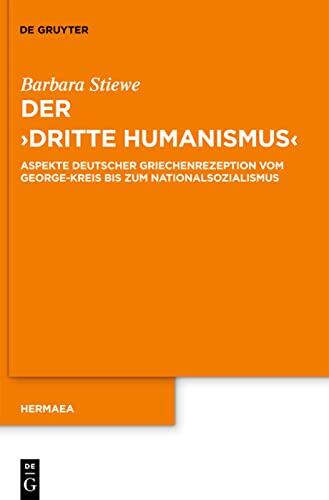
Der ""Dritte Humanismus"": Aspekte deutscher Griechenrezeption vom George-Kreis bis zum Nationalsozialismus
توسط
Barbara Stiewe
هنوز رتبهبندی نشده است
History
فرمت
جلد سخت
صفحات
338
زبان
آلمانی
منتشر شده
Apr 19, 2011
ناشر
De Gruyter
نسخه
1
ISBN-10
3110235617
ISBN-13
9783110235616
توضیحات
In this insightful examination, the author delves into the multifaceted relationship between German culture and Greek antiquity, tracing the influence of classical thought from the George Circle through the tumultuous period of National Socialism. The exploration highlights how these classical ideals were reinterpreted and recontextualized by various intellectuals, showcasing the complex interplay between nationalism and humanism.
Through meticulous research, the work reveals how figures within the George Circle embraced Greek culture as a means to foster a distinct national identity, drawing upon classical themes to articulate their vision for Germany’s future. Stiewe highlights the challenges and transformations within this movement as societal and political landscapes shifted, particularly during the rise of the Nazi regime, which sought to appropriate these ideals for its own agenda.
The narrative uncovers the tensions inherent in the reception of Greek thought, particularly how its philosophical underpinnings were used to both unite and divide. By examining the nuances of this period, the author sheds light on the significant impact of Greek literature, philosophy, and aesthetics on German thought.
Finally, the book serves as a crucial reflection on how cultural heritage can be reshaped by prevailing ideologies, urging readers to consider the implications of such transformations in the context of modern interpretations of humanism and national identity.
Through meticulous research, the work reveals how figures within the George Circle embraced Greek culture as a means to foster a distinct national identity, drawing upon classical themes to articulate their vision for Germany’s future. Stiewe highlights the challenges and transformations within this movement as societal and political landscapes shifted, particularly during the rise of the Nazi regime, which sought to appropriate these ideals for its own agenda.
The narrative uncovers the tensions inherent in the reception of Greek thought, particularly how its philosophical underpinnings were used to both unite and divide. By examining the nuances of this period, the author sheds light on the significant impact of Greek literature, philosophy, and aesthetics on German thought.
Finally, the book serves as a crucial reflection on how cultural heritage can be reshaped by prevailing ideologies, urging readers to consider the implications of such transformations in the context of modern interpretations of humanism and national identity.
نقدها
هنوز نظری ثبت نشده است
اولین نفری باشید که این کتاب را نقد کرده و نظرات خود را به اشتراک میگذارید
اولین نقد را اضافه کنیدسابقه خواندن
گزارشهای خواندنی یافت نشد
برای مشاهده گزارشها در اینجا، شروع به ردیابی پیشرفت خواندن خود کنید
اضافه کردن اولین سابقه خواندن شمایادداشتها
گزارش تراکنشها
هیچ گزارش تراکنشی یافت نشد
برای مشاهده گزارشها در اینجا، شروع به ردیابی معاملات کتاب خود کنید
اضافه کردن اولین سابقه تراکنش شما